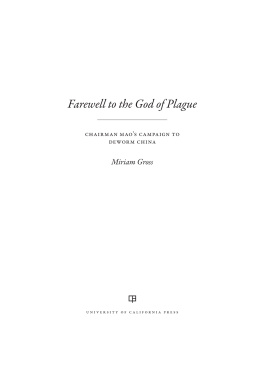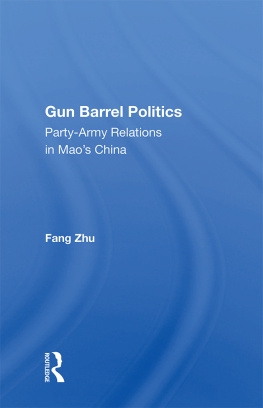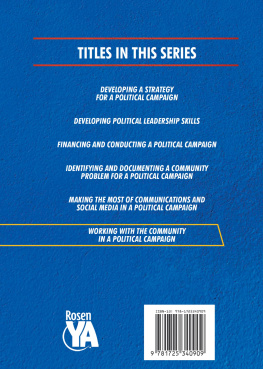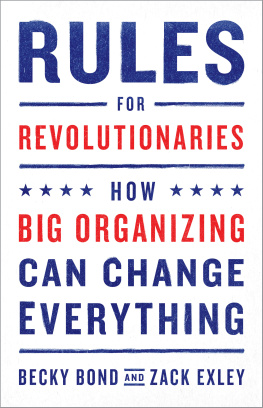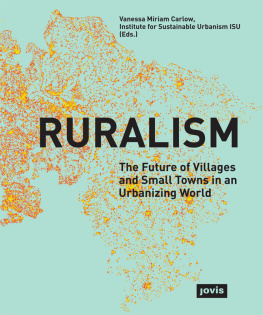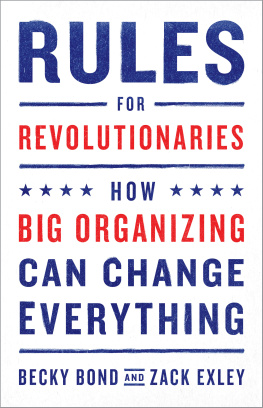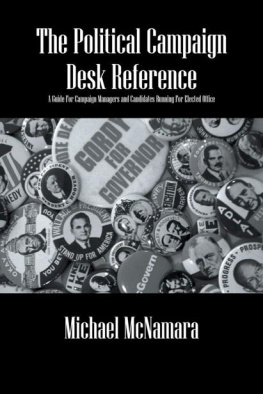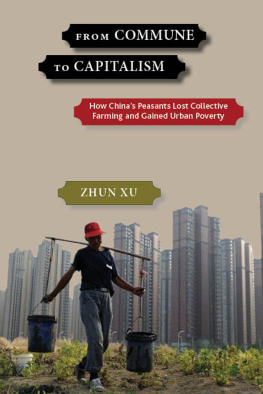Farewell to the God of Plague
CHAIRMAN MAOS CAMPAIGN TO DEWORM CHINA
Miriam Gross

UNIVERSITY OF CALIFORNIA PRESS
University of California Press, one of the most distinguished university presses in the United States, enriches lives around the world by advancing scholarship in the humanities, social sciences, and natural sciences. Its activities are supported by the UC Press Foundation and by philanthropic contributions from individuals and institutions. For more information, visit www.ucpress.edu.
University of California Press
Oakland, California
2016 by The Regents of the University of California
Library of Congress Cataloging-in-Publication Data
Gross, Miriam, 1969- author.
Farewell to the god of plague : Chairman Maos campaign to deworm China / Miriam Gross.
pages cm
Includes bibliographical references and index.
ISBN 9780-520288836 (cloth : alk. paper) )
ISBN 9780-520963641 (e-edition)
1. SchistosomiasisChinaPreventionHistory20th century. 2. SchistosomiasisTreatmentChinaHistory20th century. 3. Medical policyChinaHistory20th century. 4. Medical careChinaHistory20th century. I. Title.
RA644.S3G76 2015
362.19696300951dc232015025634
Manufactured in the United States of America
24 23 22 21 20 19 18 17 16 15
10 9 8 7 6 5 4 3 2 1
In keeping with a commitment to support environmentally responsible and sustainable printing practices, UC Press has printed this book on Natures Natural, a fiber that contains 30% post-consumer waste and meets the minimum requirements of ANSI/NISO Z 39.481992 ( R 1997) ( Permanence of Paper ).
This book is dedicated to the many doctors, activists, and Party members who fought against great odds to make the snail fever campaign succeed.
It is also dedicated to my grandparents:
To my grandma Clara, whose wonderful stories of her childhood helped turn me into a historian.
To my grandpa Sam, whose clarity of vision and strategic mind set a benchmark for wending my way through difficulty.
To my grandma Mollie, whose combination of grit and caring showed me the best way to get through life.
FAREWELL TO THE GOD OF PLAGUE
Mao Zedong
When reading the Peoples Daily on June 30, 1958, I saw that Yujiang County had wiped out schistosomiasis. My mind churned with so many thoughts, I could not sleep. A gentle breeze blew warmly as the rising sun overlooked my window. Looking afar at the southern sky, I was inspired to write.
I.
Crystal-clear water
Emerald mountains,
Gorgeous to no avail.
Even Hua Tuo,
[The god of medicine],
Was helpless
Before this little worm.
In thousands of villages
Overrun with weeds,
Men are wasting away, shitting.
Thousands of homes
Are deserted.
Ghosts sing there.
Sitting here every day
We travel eighty thousand li.
Surveying from afar
I see a thousand Milky Ways.
Should the Cowherd inquire of the God of Plague,
The God would reply:
The same joys and grief
Pass away with the tides.
II.
Poplars and willows
Gust in the spring wind,
Swelling to a million.
The six hundred million
Of this sacred land,
All as great as the gods Shun and Yao.
At our whim,
Red rain turns into waves,
With our effort,
Emerald mountains turn
Into bridges.
With lustrous hoes,
We can flatten,
Linking the Five Peaks.
With arms like iron,
We can move the earth,
Shaking the Three Rivers.
May I ask, God of Plague,
Where can you go?
Paper boats burn,
Candles ignite scorching the skies,
[Sending you home].
Translation by Miriam Gross and Bo Kong
CONTENTS
ILLUSTRATIONS
TABLES
FIGURES
MAP
ACKNOWLEDGMENTS
This book could not have been written without the help, support, and insight of a wide community of scholars, scientists, archivists, administrators, campaign participants, friends, and family. I was very lucky to have Peter Gillette as my earliest professional mentor. He reshaped my writing along more realistic lines and introduced me to the world of hospitals, medicine, and underserved communities. I have no doubt that my decision to study the history of public health was directly related to my experiences with Peter, and his example of combining humanitarian outreach with medical expertise influenced how I researched this campaign. During my Columbia masters program, I gained my earliest graduate mentoring from Madeleine Zelin and Thomas Bernstein, both of whom combined breadth of scholarship with inspirational teaching.
My greatest debt goes to Joseph Esherick and Paul Pickowicz, who created a spectacular modern Chinese history program at University of California, San Diego (UCSD). Joes critical inquiry and extensive knowledge shaped me as a scholar; Paul helped me to be a better writer and effectively argue my point; together they created a fantastic, multigenerational academic community of fellow students and faculty that will stand me in good stead throughout my academic career. I am particularly grateful to Ye Wa, a bosom buddy, who not only labored under the burden of helping me conquer my first academic Chinese, but also was the first person who told me about Maos snail fever campaign and worked with me at the beginning of my research. After the UCSD program, Joe and Ye Wa became colleagues and friends. My UCSD network was also critical to my success. Marta Hanson, now at Johns Hopkins, introduced me to the history of Chinese medicine; Andrew Scull widened my inquiry to public health, colonial medicine, politics, and society; and Martha Lampland familiarized me with the history of science and provided depth through her work on science in Hungarian Communist systems. All three have gone above and beyond as long-term mentors and inspirations. Marta Hanson, Suzanne Cahill, Lu Weijing, and Sarah Schneewind provided me with a grounding in earlier Chinese history and encouraged me to think beyond the modern period. Dick Madsen became both an academic mentor and personal friend. He helped me think about how moral and spiritual issues intertwine with politics. Finally, Gail Hershatter, my outside committee member from University of California, Santa Cruz, has been an unfailing mentor. Her incisive comments and knowledge about gender studies have served as an inspiration.
A series of fellowships enabled both my graduate experience and my work in China. I am very grateful for the UCSD Chinese History Fellowship; the University of California Pacific Rim Award; the Fulbright Institute of International Education Fellowship; the Social Science Research Council International Dissertation Fellowship; and two University of Oklahoma Junior Faculty Research Fellowships. Financial support was also provided by the Office of the Vice President for Research, University of Oklahoma. Thank-you all.
My work in China would not have been possible without my affiliation with Fudan University and the help of Gao Xi, my faculty mentor, a historian of Chinese medicine. Professor Gao shared her house, expertise, and connections, providing a true example of hospitality and mentoring. I cannot thank her enough. I also owe great thanks to the institutions, librarians, archivists, scientists, and museum directors who not only made this work possible but also helped me accomplish it. I extend special thanks to the Second Historical Archive, the Shanghai Municipal Archive, the Qingpu District Archive, the Jiangxi and Jiangsu Provincial Archives, the Beijing National Library, the Beijing Chinese Academy of Sciences Library, the Shanghai Municipal Library and its off-site book depository, Fudan Library, the Shanghai Institute of Parasitic Diseases, the Qingpu Department of Health, the Rentun Schistosomiasis Control Exhibition, the Yujiang County Songwenshen Memorial Hall and archive, the UC Berkeley East Asian Library, and the UC Berkeley Center for Chinese Studies. All of you made a special effort to work with the sometimes difficult requests of this foreign researcher.

